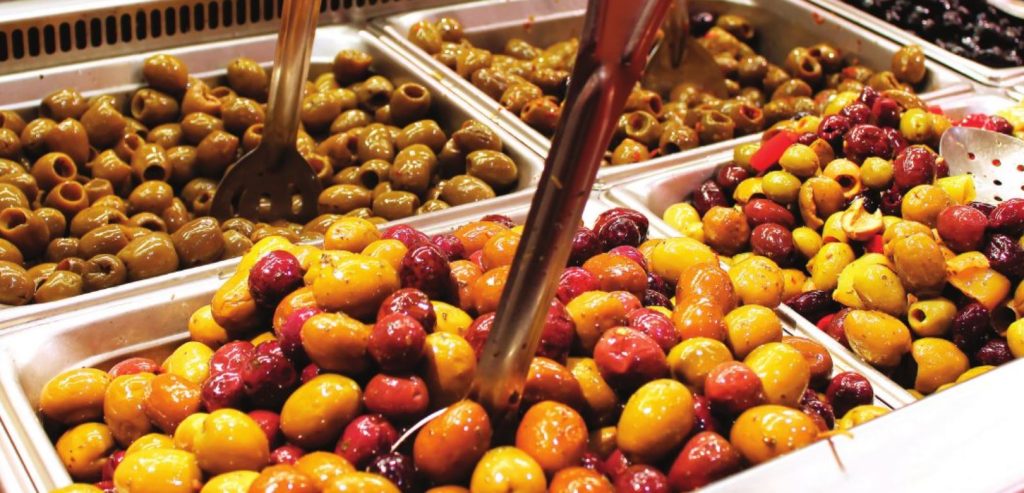Olives Are the Perfect Complement
December 1, 2022 | 5 min to read
Consumers are increasingly enjoying olives, with varieties like Kalamata, Sevillano, and Picholine becoming staples for meals and gatherings, according to the International Dairy Deli Bakery Association. Sales are boosted by demand for convenience and healthy eating, leading companies like DeLallo and Bell-Carter Foods to innovate with new flavors. Despite a pandemic-related dip, olive bars are making a comeback, and olives are marketed as essential for enhancing meals and snacking occasions.

Kalamata, California Sevillano, Castelvetrano and Picholine are some of the staple olives that you will find at grocery stores, as consumers purchase these products as supplements to meals, party plates and charcuterie boards.
Olives are also a perfect item to bring on a picnic or to a music festival, and the popularity continues to increase.
The Madison, WI-based International Dairy Deli Bakery Association (IDDBA) notes black ripe olives continue to be a staple in the U.S. market, as consumers enjoy the versatility of the product, frequently incorporating these in salads, on pizza, and in various other recipes. Tangy, savory stuffed green olives are also popular among consumers and are also often used in recipes, cocktails as well as snacks.
DeLallo, headquartered in East Mckeesport, PA, offers olives in bulk format for bars and foodservice, deli fresh packages in sizes from 4 to 16 ounces, deli cups, multipack and club formats.
“DeLallo offers most every olive that is grown to be cured as a table olive, concentrating on Mediterranean countries as well as the Sevillano variety that we grow and cure in California,” says Giuliana Pozzuto, the company’s marketing manager. “These remain a popular item, and we have seen the category grow and grow.”
Bell-Carter Foods LLC, headquartered in Walnut Creek, CA, is the leading global table olive supplier focused on providing innovative, best-in-class olive products.
“In addition to our iconic Lindsay California-style black ripe olives and Pimiento-Stuffed Spanish olives, we offer premium clean label olives across our Lindsay Crafted and Organic portfolios,” says Scott McCoy, vice president, olive division at Bell-Carter Foods.
Table olives typically come in cans, jars and single-serve cups/pouches; the olives themselves are commonly pitted, sliced/halved, stuffed or whole (with pits).
“We’ve seen increased consumer interest in convenience,” says McCoy. “Our Lindsay black ripe sliced olives remain especially popular as consumers continue to cook at home, and our organic offerings are fueling consumer needs for healthy eating, with Lindsay Organic olives sales continuing to thrive.”
A Thing of the Past?
One change since the pandemic is that olive bars are not as popular as they once were, with consumers turning more towards pre-packaged olive assortments.
“The business has adapted to some customers purchasing groceries online so prepacked olives have grown in popularity,” says Pozzuto.
Still, Pozzuto has seen things start to turn around this summer, with something of a resurgence of olive bars in many stores, explaining that while 2020 and much of 2021 were almost exclusively packaged olives, over the last year or so, stores such as Kroger, Wegmans and Publix have all returned olive bars to their locations.
“Olive bars are most certainly prevalent, and most all of our retail partners have opened bars back up entirely or to some degree,” says Pozzuto. “Even with consumers purchasing groceries online throughout the week as a supplement for staples, they are still visiting stores for the entertainment and gatherings, and olive bars provide a destination to fulfill antipasti boards and charcuterie trays.”
New and Improved
Many olive companies are experimenting with flavor and mixes, and that has added some new products for the deli department in the category.
“We have a couple of new Olive & Antipasto mixes that we will be launching in Q2; they are a response to new and emerging flavors and pairings we have seen trending in the category,” says Pozzuto. “And in the first quarter of 2023, we are launching two more deli dips to add to our current Spicy Sweet Pepperazzi Dip. One Featuress pepperoncini peppers and the other, a twist on the classic artichoke dip.”
At Bell-Carter Foods, the company refuses to rest on its laurels and is continuing to add to its impressive selection.
“We have long been considered an innovative company,” says McCoy. “We continue to see sustained demand for our industry-leading organic black ripe olives and clean label crafted green ripe olives. With that in mind, we are exploring exciting new offerings that are focused on expanding clean label and high-quality table olives that create an indulgent eating experience at home.”
Shelf Life
Shelf life for olives packaged in tin cans and glass jars are typically 3-4 years from production, which makes olives a great pantry staple for many U.S. households. However, shelf life is reduced significantly for any plastic materials such as PET as well as once the package is opened.
“Shelf life is not an issue with most all olives because they are a full fermented fruit,” says Pozzuto. “Provided that they are kept in refrigeration, an olive can hold on an olive bar over 30 days and in packages over six months.”
Marketing and Merchandising
McCoy notes increased awareness for the category among younger consumer cohorts will continue to be a big marketing opportunity for olives.
“Reaching new consumers with recipe and usage inspiration, such as part of a charcuterie or snacking board occasion, will further drive category penetration and keep olives top-of-mind and relevant,” he says.
After all, olives are a great way to enhance any meal, and cross merchandising opportunities exist throughout the store to improve sales.
For example, Bell-Carter Foods’ Lindsay notes that black ripe sliced olives have proven to be an excellent and healthy addition to quick weeknight dinners such as taco night or DIY pizza.
“Spanish Green Olives are star ingredients in more elaborate recipes like Italian Chicken Cacciatore or New Orleans-Style Muffuletta Sandwiches,” says McCoy. “Lindsay Crafted Medleys can simply elevate any holiday entertaining charcuterie board or wine and cheese pairings.”
Olives are best merchandised, Pozzuto notes, with a number of counterparts on antipasti boards to include other preserved vegetables, cheese, salami, crostini toasts, bruschetta and fruit spreads.
“Destination displays to include all the charcuterie accompaniments will help stores sell more olives,” says Pozzuto. “Include olives at a normal SRP in promotions of specialty cheese and salami. [Merchandise olives in] themed displays for the holidays. [Include olives in the] preparation of charcuterie boards for both grab-and-go and events. All of this will help bring rings to the register.”
Olives shouldn’t be thought of as just a topping or garnish. Olives are a great way to enhance and elevate any eating occasion.
With increasing inflationary pressures and continued consumer demand to eat clean and eat well, olives are an affordable, flavorful and healthful ingredient to enrich any meal.
5 of 9 article in DeliBusiness Dec/Jan 2022

